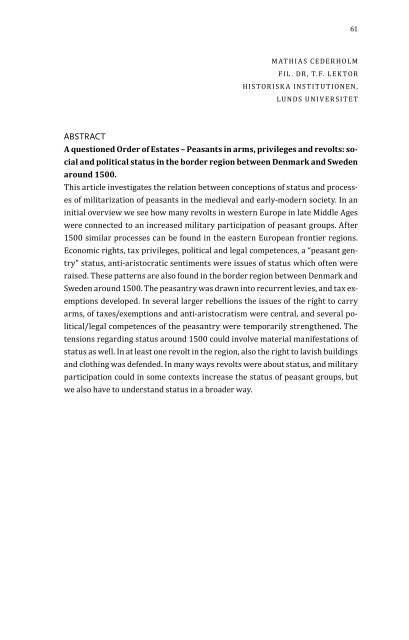temp nr. 4 2012 - temp – tidsskrift for historie
temp nr. 4 2012 - temp – tidsskrift for historie
temp nr. 4 2012 - temp – tidsskrift for historie
Create successful ePaper yourself
Turn your PDF publications into a flip-book with our unique Google optimized e-Paper software.
61<br />
MATHIAS CEDERHOLM<br />
FIL. DR, T.F. LEKTOR<br />
HISTORISKA INSTITUTIONEN,<br />
LUNDS UNIVERSITET<br />
ABSTRACT<br />
A questioned Order of Estates <strong>–</strong> Peasants in arms, privileges and revolts: social<br />
and political status in the border region between Denmark and Sweden<br />
around 1500.<br />
This article investigates the relation between conceptions of status and processes<br />
of militarization of peasants in the medieval and early-modern society. In an<br />
initial overview we see how many revolts in western Europe in late Middle Ages<br />
were connected to an increased military participation of peasant groups. After<br />
1500 similar processes can be found in the eastern European frontier regions.<br />
Economic rights, tax privileges, political and legal competences, a “peasant gentry”<br />
status, anti-aristocratic sentiments were issues of status which often were<br />
raised. These patterns are also found in the border region between Denmark and<br />
Sweden around 1500. The peasantry was drawn into recurrent levies, and tax exemptions<br />
developed. In several larger rebellions the issues of the right to carry<br />
arms, of taxes/exemptions and anti-aristocratism were central, and several political/legal<br />
competences of the peasantry were <strong>temp</strong>orarily strengthened. The<br />
tensions regarding status around 1500 could involve material manifestations of<br />
status as well. In at least one revolt in the region, also the right to lavish buildings<br />
and clothing was defended. In many ways revolts were about status, and military<br />
participation could in some contexts increase the status of peasant groups, but<br />
we also have to understand status in a broader way.




